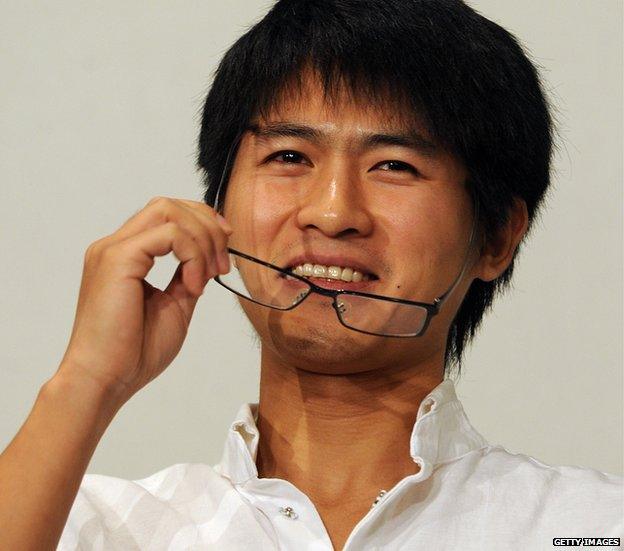Has China silenced its bloggers?
- Published

Blogger Han Han, pictured in 2010. He used to be a scathing government critic but in recent years has stuck to less controversial topics
Two years ago Sina Weibo - China's equivalent of Twitter - was crawling with tales of political scandal. Today those stories are harder to find, and government figures suggest the online community in the country has become more docile. What happened?
It started with a smile. In the summer of 2012 a Chinese government official was pictured grinning at the scene of a bus crash in Shaanxi Province. Web users, annoyed by his cheerful demeanour at the scene of a tragedy, began trawling through other images of the official and found something that many found unsettling. In picture after picture, people noticed that the civil servant was wearing a string of luxury watches, and people demanded to know how he could afford them on his modest salary. The outcry led to a jail sentence for the official, and kick-started a wave of similar scandals, many of which came to light on the Sina Weibo social network.
Allegations of corruption on the network increased following the incident, according to an independent assessment by an Australian journalist, external. In the six months following the scandal, 104 allegations were posted, and in 2013 there were a further 229. But then something changed. In 2014 the number of allegations plummeted, to just 51.
The figures were reported by Angus Grigg, China correspondent for the Australian Financial Review, external, who cited statistics from the Communications University of China.
The downward trend may have been helped by a law introduced in 2013 to prevent "rumours" spreading online. It means those posting allegations to Sina Weibo risk being jailed for up to three years if their messages are shared more than 500 times. Rather than leading to a raft of convictions, the effect of the law has been to encourage self censorship, says Tommy Wen, a journalist and blogger based in Beijing. He says his Sina Weibo account has been closed more than 10 times. Although he's not sure of the reasons, and has never been contacted directly by the government, he suspects they were prompted by his posts about the Dalai Lama and Tiananmen Square - two hugely sensitive subjects in China.
As well as the statistics, anecdotal evidence suggests China's new breed of superstar bloggers, many of whom were fiercely critical of the authorities just a few years ago, have also lost their taste for controversy. One of the most famous - Han Han - was known for his scathing critiques of the Chinese government.
"For the last five or six years he was China's most influential blogger," Grigg tells BBC Trending. "He was a high school dropout with Korean pop star good looks. He really pulled no punches. He had a very sharp pen, and he would call the [Communist] Party out for its hypocrisy, and highlight environmental atrocities." But about two years ago, something changed. "Gradually he started pulling back from writing on controversial subjects, he now focuses on putting up pictures of his Alaskan dogs. He sticks to very neutral subjects," says Grigg.

BBC Trending Radio
Hear more about this story on the BBC World Service - you can stream our radio programme or download our podcast.

It isn't clear whether the government put direct pressure on Han Han to alter his approach, or if there is another reason for his change in tone. But other cases are more clear cut. In 2013 another high profile blogger, Charles Xue, was detained for soliciting prostitutes, and admitted to spreading information irresponsibly from his prison cell - his confession was broadcast on national television. Grigg says that around a month ago the government hosted a "re-education camp" for high profile bloggers, where they were told they "needed to co-operate, or there will be consequences," and that they would be offered benefits for their acquiescence.
A revival of controversial political blogging in the country seems unlikely for the time being. Just this month the government extended the restrictions on what can be posted online via a national security law, even though the law has been criticised by the United Nations for its "extraordinarily broad" scope. BBC Trending contacted the Chinese government for a response, but has not had a response.
Blog by Sam Judah, external